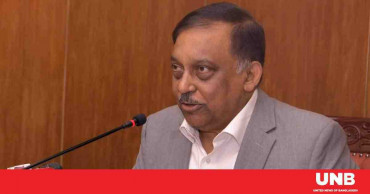Joint Drive
Army to join drive against terrorism, drugs in Rohingya camps: Home Minister
Home Minister Asaduzzaman Khan on Sunday said that the army will take part in the joint operations to be launched in the Rohingya camps to control terrorist activities and spread of drugs.
The minister said this emerging from the fifth meeting of the ‘National Committee on Forcibly Displaced Rohingya People’s Coordination, Management and Law and Order Situation’ at the Secretariat.
“We’re witnessing frequent terrorist activities inside the Rohingya camps. Bloodshed is going on in the camps without any reason. Sometimes even drugs from Myanmar are finding their ways to the camps. That’s why we’ve decided to conduct information-based joint operations to put an end to the menaces,” said Asaduzzaman.
“Currently, Police, Border Guard Bangladesh (BGB), Rab, Ansar and Armed Police Battalion (APBn) members are working in the camps. We’ve decided that from now on, the military will also join hands with these forces and carry out joint drives to make the Rohingya camps secure for its inhabitants,” he added.
He informed that the government sometimes fail to identify Rohingya criminals because they use Myanmar’s network systems.
“We’re trying our best so that Rohingyas use Bangladeshi network systems. This will make the identification of Rohingya criminals easier,” said the minister.
The home minister also said that the government is setting up a system which will ensure constant surveillance of the Rohingya people.
Read: Requested US, UK, Japan to take Rohingyas from Bangladesh: FM
“The construction of security walls around the camps is in its final stage. Building of patrol roads is going to be finished soon. We’ll also build watchtowers at various points inside the camps so that Rohingyas can’t escape our eyes,” Kamal said.
About the government’s initiative to control the birth in the camps, the minister said that the process to formulate a SOP is underway.
“The health ministry and the Islamic Foundation are jointly working on this issue. Volunteers, Imams of local mosques and NGO workers are also going door to door and making the Rohingyas aware of the benefits of birth control,” said Asaduzzaman.
On controlling the movement of drugs, the minister said that registration of fishing trawlers that ply on the Naf river is going on.
Replying to a question, he said that the government is discussing the Rohingya repatriation issue with Myanmar.
“We’re trying to repatriate the Rohingyas to Myanmar from day one. Both our foreign minister and I talked to Myanmar’s then leader Aung San Suu Kyi personally about the issue. Each time we go to the discussion table with a hope that the matter will be resolved soon. I hope that we’ll be able to find a solution to the problem within a very short time,” said the minister.
Replying to another question, he said that the government is yet to receive proposals from countries that are interested in relocating Rohingyas.
“We’re reviewing the countries that have showed interest in the relocation of the Rohingyas. The foreign ministry is working on it. We’ll request the interested countries to take as much Rohingyas as possible,” said the minister.
At present, Bangladesh is hosting over 1.1 million Rohingya people in camps located in Cox’s Bazar and Bhasan Char island.
3 years ago

